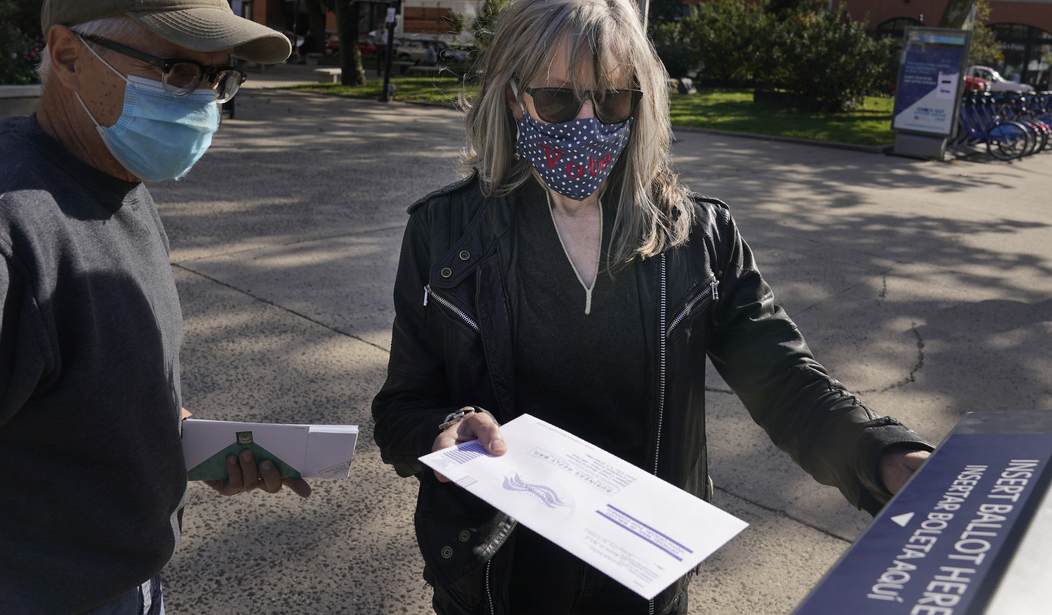When it comes to the topic of ballot harvesting, “AP” doesn’t stand for The Associated Press; it stands for Agit-Prop.
Here I was at my brother-in-law’s house in Montana, minding my own business and going through my email and social media to catch up after a long drive from South Dakota. On his kitchen counter was a copy of the Billings Gazette. I confess to not having actually read a hard-copy newspaper – or even an online version – for many months – due to their “institutional bias” against non-Democrats, so I picked it up and browsed through the front section to see what was being dished out to Montanans by their leading newspaper.
The headline writer successfully did his job, as I was immediately triggered by the featured story from an AP hack entitled, “Court upholds voting limits,” and subtitled, “Ruling another blow to Voting Rights Act.” The article of course was referring to the landmark US Supreme Court decision that upheld a new election integrity law in Arizona that eliminated counting ballots cast in the wrong precinct and also “forbids most people except for family members to collect and deliver ballots to the polls.” Nowhere in that article was any explanation given for the purpose of those laws, i.e., to improve integrity by precluding the submission of fraudulent ballots while placing the burden on individual voters to complete the privilege of voting, as opposed to allowing others to “do it for them” through ballot harvesting and other chicanery. In short, the goal of that new law is to ensure that valid votes legally cast are not undermined through ballot fraud by votes cast illegally.
That’s a pretty straightforward commonsense principle that a majority of Americans support. Toward that end, a Rasmussen poll in April provided the following insights:
Most voters say it’s more important to prevent cheating in elections than to make it easier to vote and, by more than a two-to-one margin, they reject claims that voter ID laws are discriminatory.
The latest Rasmussen Reports national telephone and online survey finds that just 29% of Likely U.S. Voters say laws requiring photo identification at the polls discriminate against some voters. Sixty-two percent (62%) say voter ID laws don’t discriminate.
A majority (51%) of voters believe it is likely that cheating affected the outcome of the 2020 presidential election, including 35% who say it’s Very Likely cheating affected the election.
A question for the AP hack who wrote that article in the Billings Gazette: with a continuing stream of revelations about election fraud making the news since April, is it more or less likely that even greater numbers of Americans than in that Rasmussen poll now support the kinds of election integrity laws that Arizona just passed and that SCOTUS upheld? A follow-up question: then why don’t you provide any semblance of balance in reporting that majority position in your article that could just as easily have been written by the Democrat National Committee or Perkins Coie? And a third question: did you provide your draft article to any Democrat operatives prior to submission, or are you yourself nothing but a Democrat activist masquerading as a journalist?
Think that’s a bit too harsh? Let’s look at the points made in that article:
- The first paragraph frames the SCOTUS decision as an attempt to “cut back” on the Voting Rights Act. It is stated as a given without a shred of evidence or argument.
- The second paragraph cites unnamed “civil rights groups and liberal dissenting justices” who claim that the SCOTUS decision undermines the Voting Rights Act – again without any explanation or argument, merely stated as a “fact.”
- Other than quoting out of context from Justice Alito’s majority opinion, the entire article quotes leftwingers: The Hologram, Justice Elena Kagan, Sen. Tim Kaine (D-VA), Sen. Ed Markey (D-MA), and leftwing “election expert” Rick Hasen. Check out Hasen’s Twitter timeline and pinned tweet to see just how leftwing he is:
- The rest of the article cites claims without evidence: generalities about “excessive burdens” placed on minority voters by the new law with no specifics.
- And of course, the article conveyed the Democrat narrative that SCOTUS needs to be packed with more liberal justices beyond the nine presently on the court. (When the Democrats can’t achieve their political objectives with the people’s support, judicial fiat by leftwing justices is their go-to tactic.)
Democrats have been apoplectic about SCOTUS upholding the ballot harvesting restriction in that Arizona law because they know it drives a stake in the heart of their systemic efforts to manufacture illegal votes by setting a precedent that will allow other states to ban ballot harvesting. And that AP article is an example of the Democrat-media rage.
Rather than quoting Justice Alito out of context, the AP hack should have quoted directly from the SCOTUS decision, which blew away the DNC’s claim that the new law “suppresses” minority voters by restricting out-of-precinct voting, but hey – can’t have the facts interfering with the Democrat narrative! Emphasis added below:
[T]he racial disparity in burdens allegedly caused by the out-of-precinct policy is small in absolute terms. Of the Arizona counties that reported out-of-precinct ballots in the 2016 general election, a little over 1% of Hispanic voters, 1% of African-American voters, and 1% of Native American voters who voted on election day cast an out-of-precinct ballot. For non-minority voters, the rate was around 0.5%. A procedure that appears to work for 98% or more of voters to whom it applies—minority and non-minority alike—is unlikely to render a system unequally open.
The SCOTUS decision also torpedoed the Democrats’ claims that restrictions on ballot harvesting would suppress absentee mail-in voting by minority voters (emphasis added):
Arizona’s HB 2023 also passes muster under §2. Arizonans can submit early ballots by going to a mailbox, a post office, an early ballot drop box, or an authorized election official’s office. These options entail the “usual burdens of voting,” and assistance from a statutorily authorized proxy is also available. The State also makes special provision for certain groups of voters who are unable to use the early voting system. See §16–549(C). And here, the plaintiffs were unable to show the extent to which HB 2023 disproportionately burdens minority voters.
By the way, that AP article and variations on the same theme before and after that particular 2 July story by the same AP hack were posted in many other newspapers across the country. Same message, same Democrat narrative, same one-sided reporting, same shading of the facts of the case and the reason for the sound ruling made by SCOTUS.
But that AP article wasn’t the only biased AP reporting in that edition of the Billings Gazette. Here are some others noted:
- A front-page article on wage and price growth that failed to mention a primary cause (e.g., The Hologram’s disastrous “America Last” policies, such as shutting down the Keystone XL pipeline, and the Democrats’ overall policy of keeping states shut down)
- A featured article on page three with the blaring headline that “Garland halts executions” (that’s the typical Democrat position not supported by 60% of Americans who favor the death penalty for certain crimes, as even the leftwing Pew Research Center reported in a poll just last month; so much for The Hologram’s regime seeking “consensus” on key issues)
- Also on page three, an article about Trump’s CFO being charged in a tax fraud scheme (most thinking Americans know damn well that this was a politically motivated prosecution, and yet that’s all the Manhattan DA could come up with after 3-plus years of investigation; nothing about that in the article, of course)
- Buried in the bottom corner, an article noting that the CBO predicts that federal deficit will hit $3 trillion this year (not included and not mentioned were The Hologram’s $6 trillion in proposed deficit-spending for “infrastructure” purposes, including Green New Deal boondoggles)
- A handwringing story on page 5 about the US pulling out of the base at Bagram, Afghanistan, after 20 years (never mind the AP’s cheerleading for endless wars over the years)
- Fearmongering on page 6 about the “Delta variant’s low vaccine rates,” pushing “vaccinations,” and advocating for masks (we’re on to that B.S.)
- Buried on page 6 was an article detailing The Hologram missing his promised goal of 80 million “vaccine” doses to other countries by the end of June (I seem to recall a recent US president who actually did keep his promises, don’t you?)
- An article on page 7 intended to put pressure on Democrats to push HR1/S1 and a new “John Lewis Voting Rights Act” ginned up in response to the SCOTUS decision
- An article on page 8 (the back page of the front section) about Arctic ice melting due to “climate change” (implying without evidence that humans are “responsible” while even throwing in the old “last refuge for polar bears” canard)
Keep in mind that the above articles were in just one issue of the Billings Gazette. Imagine what Montanans must have seen in 2020 during the election campaign when the AP was full-bore in the anti-Trump reporting mode (not to mention during the two impeachments!). Worse yet, there are a lot of small and medium-sized papers across the country that routinely print AP stories and leftwing op-eds. I simply can no longer read the Mitchell Republic, the Yankton Daily Press and Dakotan, or the Sioux Falls Argus Leader in my own home state because of their inherent and incessant pro-Democrat bias.
Unconfirmed but nevertheless attributed to him, Joseph Goebbels was right about big lies becoming the truth if repeated often enough! Imagine the agitprop effects of reading AP stories over a few months or years, as some people have surely done.
Thank God for alternative news sources that actually provide facts and some semblance of ideological balance! That certainly isn’t the Associated Press.
The end.














